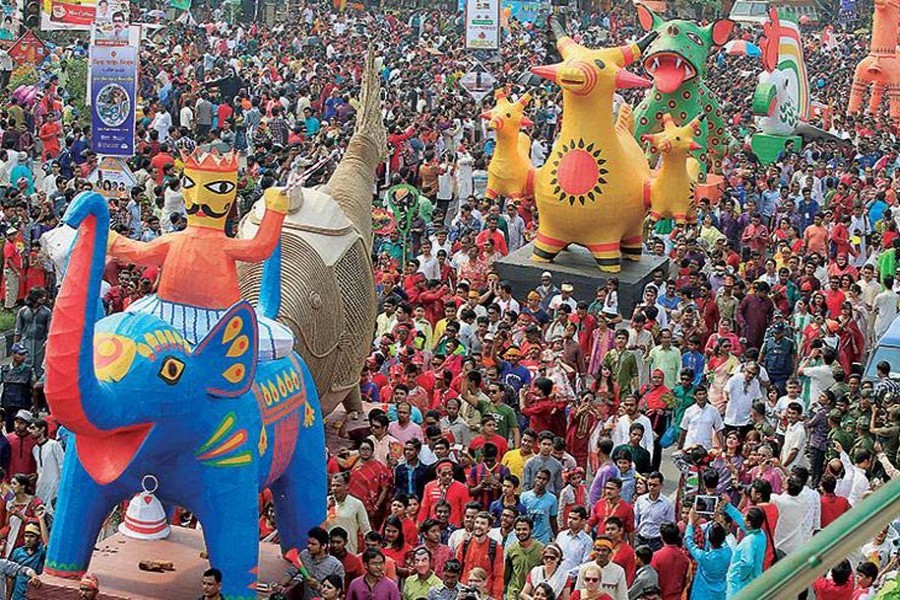
Published :
Updated :

For consecutive two years, the celebration of the Pahela Baishakh, Bangla New Year, had to be postponed amid a raging coronavirus pandemic. If anything of this order ever happens, the psychological impact weighs heavily on the people. This time things are looking up with the pathogen nearly completing its retreat. So the nation has every reason to get emotional and passionate about making the occasion memorable. The inherent theme of all New Years is renewal or making a fresh start or else, life becomes insipid and monotonous both for an individual and a people. Celebrations bring people closer to one another with a spirit of human bond that fosters mutual sharing and caring. Unlike the revelry often associated with the celebration of the Gregorian New Year, the Bangalees' Pahela Baishakh and the indigenous hill people's Baisabi stand out for a deft touch of traditional rural art, culture and aestheticism of folk tradition.
Baishakh marks the end of Basanta or Spring, the king of all seasons. Ever since the introduction of the Bangla New Year on the first day of Baishakh under the instruction of Emperor Akbar the Great, the departure from the lunar to the solar calendar has not only brought in stability to dates on the calendar but also facilitated agricultural society's various events and rituals including festivals. Whatever little discrepancy was there had been reformed by a committee headed by Dr. Muhammad Shahidullah in 1966 and the reformed calendar was adopted by Bangladesh in 1987. By this time Bangladesh has gone through remarkable social, economic and cultural transitions. Lately, the highly flourished rural festival surrounding Halkhata and Pahela Baishakh has largely waned and the urbanites are trying to reinvent the occasion in all possible splendours. Evidently, money power and facilities are behind this shift in interests.
Yet this attempt of reliving the waning village culture and tradition in its contextual change in urban space has its significance because through this the urban people seek to re-establish their relations to their mooring. In a way, it is a mental journey back to village, to Nature and the lost world. Celebration of the Pahela Baishakh is nothing if not discovering the self amidst fellow human beings and in the context of time, space and the universe. This quest for the meaning of life together, however, has been fading fast in the socio-economic life. With Nature's regeneration at this time of the year out of a clash between the contrasting force of Kalbaishakhi (storm) and the momentum of the Spring's creative energy, the Bangalees should as well commit themselves to reshaping their life beyond the cobweb they are confined to.
The incumbency of distributing socio-economic justice is on the privileged. Let village economy be as self-sufficient as possible by investing more in rural areas and this has to be done without harming the environment. Concentration of wealth in towns and cities has been beyond all proportions, which is inimical to progress. There is a need for sharing joys and happiness with each and everyone living on the fringe. The economies of all festivals can get augmented many times more if the mass people become happy by virtue of their equal participation in those. Let Pahela Baishakh bring happiness and prosperity to all. Shuva Nabobarsho.


 For all latest news, follow The Financial Express Google News channel.
For all latest news, follow The Financial Express Google News channel.